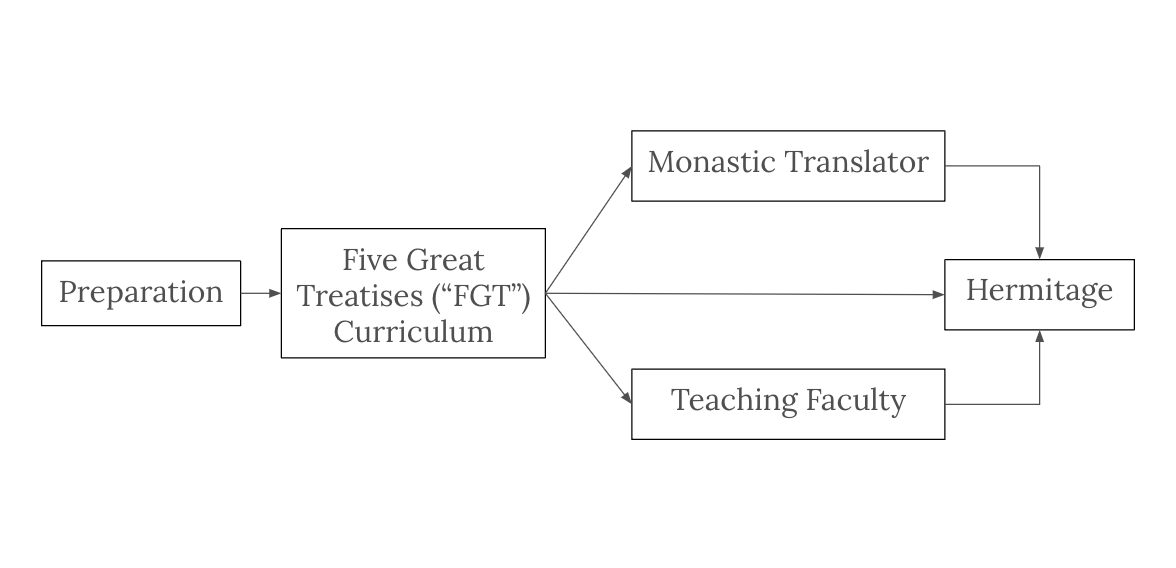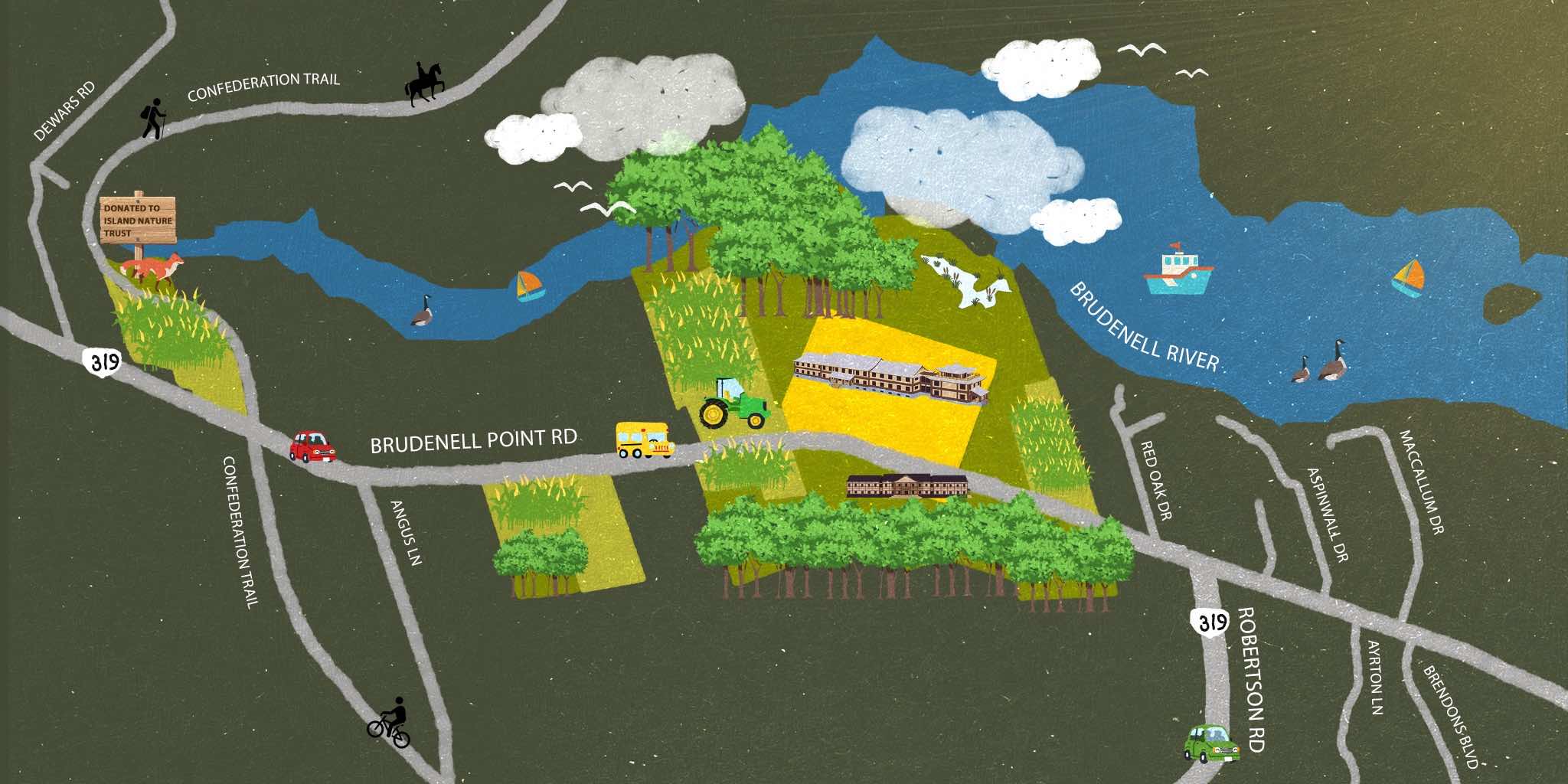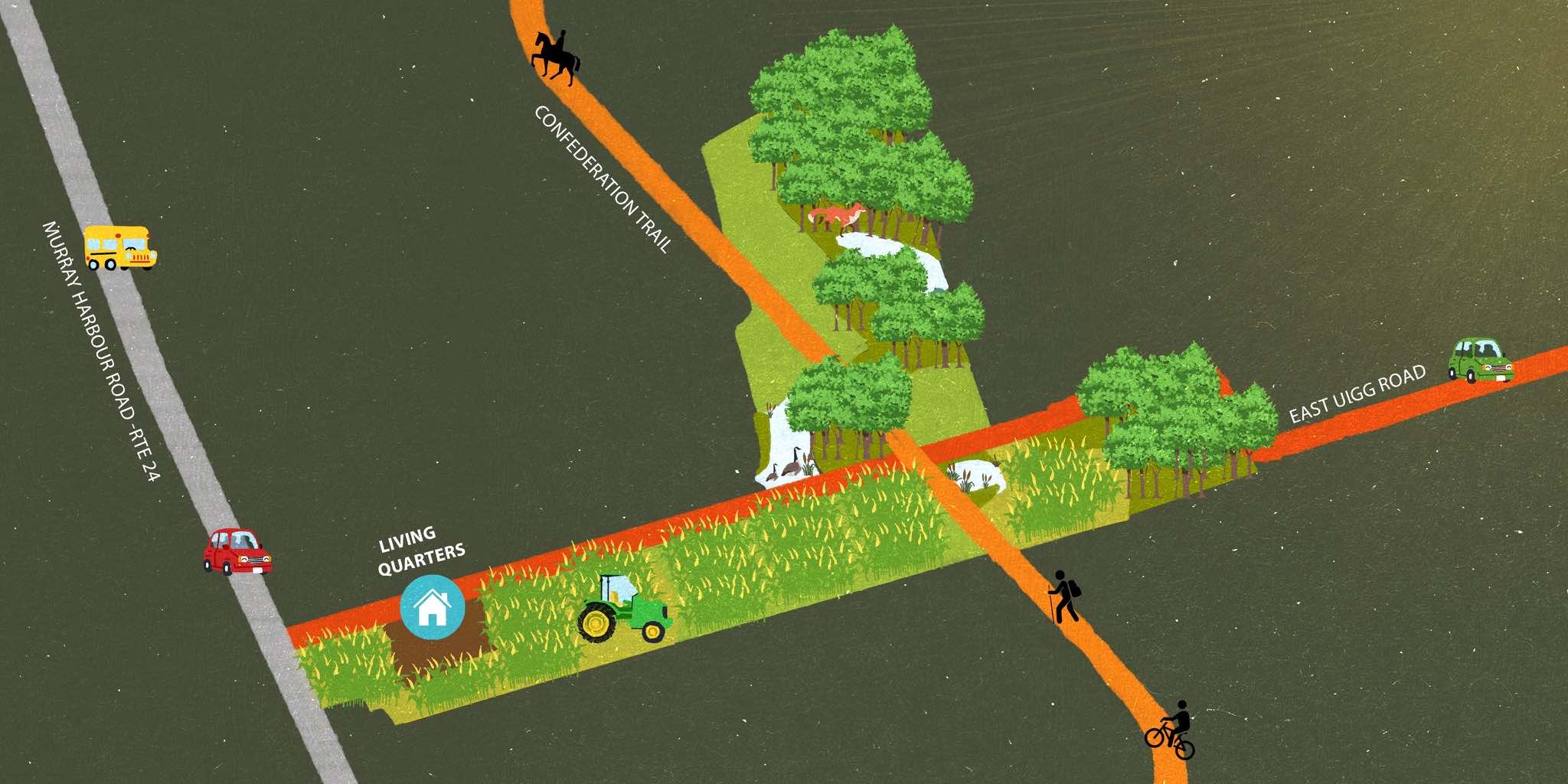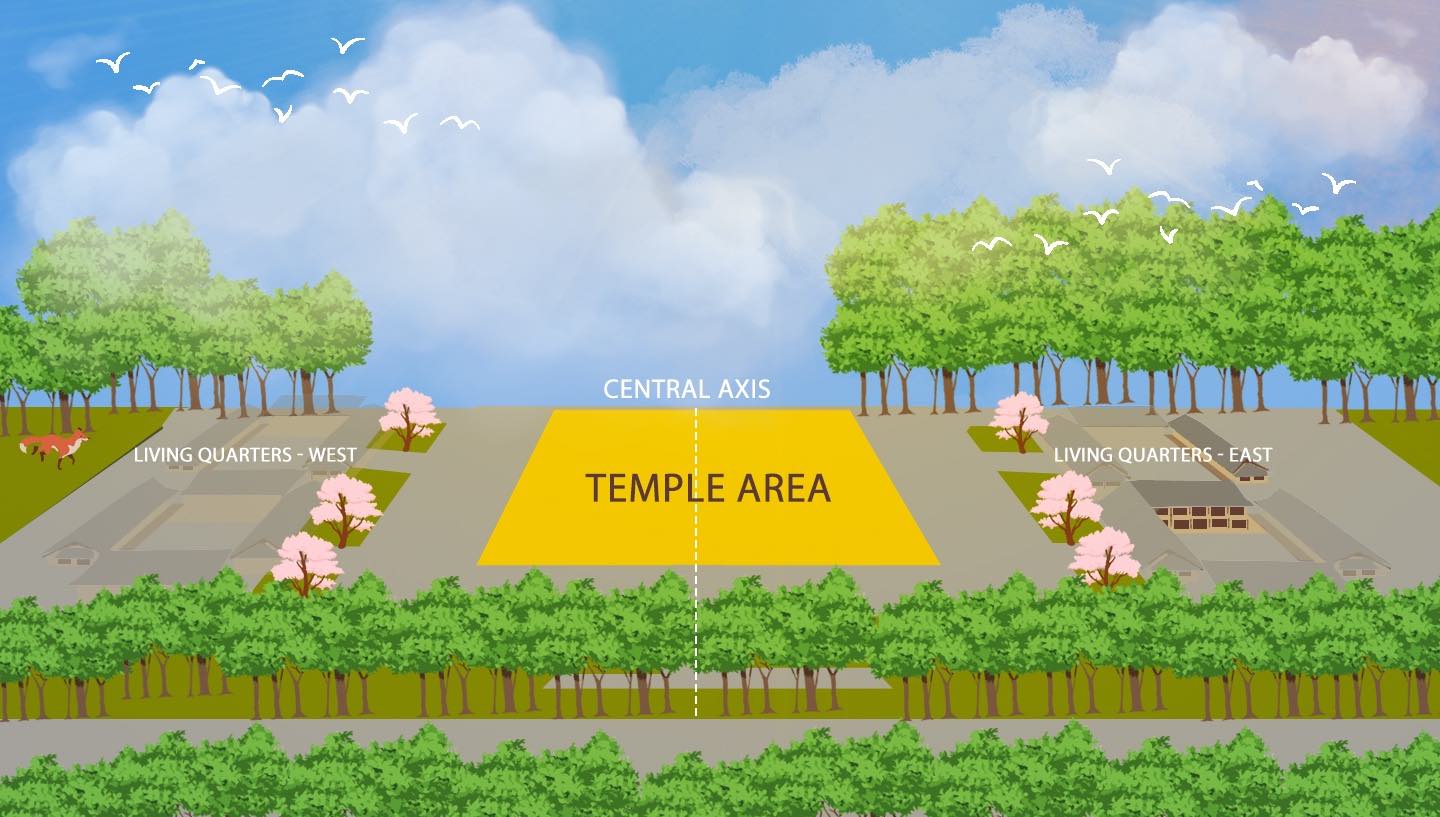FAQ
02.20.2025
General QA
As of December 2024, there are about 600 nuns in Eastern PEI, ages ranging from 12-72 years (average: 29 years). As the only monastery outside Asia offering the Five Great Treatises curriculum to all females, new students and nuns enrol at GWBI annually. 1,400 is the maximum capacity of our North Lotus campus, a number we expect to reach in 20 years or more. We arrived at this number after performing an environmental inventory—this capacity helps us maintain the ecological integrity of the monastery area with the current septic system.
Most of our Buddhist nuns are from Asia—mainly Taiwan —but we also have nuns from other parts of the world, such as the US, Singapore, New Zealand, China and other parts of Canada.
You may ask “Why are there so many nuns?” GWBI’s mission is to preserve Tibetan Buddhism and as such, many monastic translators are needed. To nurture just ONE monastic translator, an entire monastery is needed in supporting roles, either as instructors, or other roles to take care of the monastery’s daily operations, such as maintenance.
Most of our Buddhist nuns are from Asia—mainly Taiwan —but we also have nuns from other parts of the world, such as the US, Singapore, New Zealand, China and other parts of Canada.
You may ask “Why are there so many nuns?” GWBI’s mission is to preserve Tibetan Buddhism and as such, many monastic translators are needed. To nurture just ONE monastic translator, an entire monastery is needed in supporting roles, either as instructors, or other roles to take care of the monastery’s daily operations, such as maintenance.
Our nuns—along with the Buddhist monks at GEBIS—are the world’s largest group of monastic translators translating and preserving Tibetan sutras (the Sanskrit term used for Buddhist scriptures). This requires nurturing translators on a scale which the world has not seen the likes of in the past centuries: being fluent in the Tibetan language and well-versed in the traditional Tibetan Buddhist curriculum (The Five Great Treatises). On multiple occasions, His Holiness the Dalai Lama has publicly expressed his gratitude toward our Buddhist community for carrying on this task.
To support our long-term study and translation work, a location—free from political, religious, and social unrest—was needed. Canada is one of the few places in the world to offer stability, safety, acceptance, and religious freedom. PEI, unique in its kind-hearted people and serene environment, is ideal for this global mission.
To support our long-term study and translation work, a location—free from political, religious, and social unrest—was needed. Canada is one of the few places in the world to offer stability, safety, acceptance, and religious freedom. PEI, unique in its kind-hearted people and serene environment, is ideal for this global mission.
Our long term plan can be found on PEI government’s website: https://www.princeedwardisland.ca/en/feature/projects-under-environmental-review-undertakings#/service/EnvironmentalImpactAssessments/EnvironmentalImpactAssessmentView;id=85f582c4-6789-4e4f-a1da-0b91c4ba9eb4
From our construction visual, even though we have the first two living quarters built, there are many other buildings yet to be constructed—new living quarters, the temple area etc. Progress depends on the amount of donations we receive as well as approval of building permits.
It is widely understood in construction that the master plan of a development is a guiding, overarching concept. Its primary purpose is for the Environmental Impact Assessment (“EIA”), which looks at the impact on the environment when the plan is fully developed. Any new proposals will be submitted and assessed by the respective government departments.
In 2018, we went through a level 2 public consultation session for our EIA as requested by the government. The meeting invitation was advertised (see below) in the Guardian, as well as the local newspaper, for six consecutive days, inviting all Islanders to participate.

In February 2025, the Department of Environment, Energy and Climate Action responded to our inquiry and informed us that our existing EIA authorization is still valid and still applies to our project, with no need for any amendments or fresh submissions.
We will continue to hold community events such as open houses and gatherings where people have an opportunity to understand our plans and we can share updates about our construction progress.
From our construction visual, even though we have the first two living quarters built, there are many other buildings yet to be constructed—new living quarters, the temple area etc. Progress depends on the amount of donations we receive as well as approval of building permits.
It is widely understood in construction that the master plan of a development is a guiding, overarching concept. Its primary purpose is for the Environmental Impact Assessment (“EIA”), which looks at the impact on the environment when the plan is fully developed. Any new proposals will be submitted and assessed by the respective government departments.
In 2018, we went through a level 2 public consultation session for our EIA as requested by the government. The meeting invitation was advertised (see below) in the Guardian, as well as the local newspaper, for six consecutive days, inviting all Islanders to participate.

In February 2025, the Department of Environment, Energy and Climate Action responded to our inquiry and informed us that our existing EIA authorization is still valid and still applies to our project, with no need for any amendments or fresh submissions.
We will continue to hold community events such as open houses and gatherings where people have an opportunity to understand our plans and we can share updates about our construction progress.
We do not take a Vow of Poverty like Catholic nuns. As renunciates, we give up our pursuit of material comforts. As such, we limit our dependence on wealth and material comforts so that we can focus on inner cultivation and training of the mind. In addition, we uphold precepts which include not trading assets for profit.
In Mahayana Buddhism (which GWBI follows), Buddhist nuns, besides being renunciates, also aspire to develop a compassionate heart that wants to benefit all beings. Individuals do not have to decline gifts or donations from family and benefactors. Buddhist nuns accept these objects with the intention that they can aid in their learning and practice, which in turn can be used to help others. Nuns can also choose to use their assets to support altruistic endeavours, such as protecting the lives of sentient beings or safeguarding the environment.
In Mahayana Buddhism (which GWBI follows), Buddhist nuns, besides being renunciates, also aspire to develop a compassionate heart that wants to benefit all beings. Individuals do not have to decline gifts or donations from family and benefactors. Buddhist nuns accept these objects with the intention that they can aid in their learning and practice, which in turn can be used to help others. Nuns can also choose to use their assets to support altruistic endeavours, such as protecting the lives of sentient beings or safeguarding the environment.
There is no big business or government controlling GWBI, GEBIS, or Bliss and Wisdom.
Bliss and Wisdom is a religious community, not unlike a community of Christians, Jews, or Muslims. It is not a large corporation. Bliss and Wisdom references the Buddhist community founded by the late Venerable Master Jih-Chang. Anyone who acknowledges the late Venerable Master Jih-Chang and Teacher Zhen-Ru as their spiritual teachers is part of the Bliss and Wisdom Buddhist community.
Bliss and Wisdom is a religious community, not unlike a community of Christians, Jews, or Muslims. It is not a large corporation. Bliss and Wisdom references the Buddhist community founded by the late Venerable Master Jih-Chang. Anyone who acknowledges the late Venerable Master Jih-Chang and Teacher Zhen-Ru as their spiritual teachers is part of the Bliss and Wisdom Buddhist community.
Teacher Zhen-Ru is our spiritual teacher.
She was directly appointed by our first spiritual teacher, Venerable Master Jih-Chang, for her profound understanding and application of Buddhism.
In our current society, it is not as common for a female layperson to be a spiritual leader, including a spiritual teacher. As such, this appointment demonstrates both Venerable Master Jih-Chang’s forward-thinking as well as Teacher Zhen-Ru’s innate grasp of Buddhist teachings.
Our teacher does not have the final say on things like land acquisition. GWBI has an operating committee which discusses and decides how to run the monastery.
She was directly appointed by our first spiritual teacher, Venerable Master Jih-Chang, for her profound understanding and application of Buddhism.
In our current society, it is not as common for a female layperson to be a spiritual leader, including a spiritual teacher. As such, this appointment demonstrates both Venerable Master Jih-Chang’s forward-thinking as well as Teacher Zhen-Ru’s innate grasp of Buddhist teachings.
Our teacher does not have the final say on things like land acquisition. GWBI has an operating committee which discusses and decides how to run the monastery.
All comments about Teacher Zhen-Ru having close links to the CCP are false.
If Teacher Zhen-Ru had close links to the CCP, her top priority would not be preserving Tibetan Buddhism and nurturing monastics who can translate Tibetan sutras.
She has not set foot in China for more than 15 years.
If Teacher Zhen-Ru had close links to the CCP, her top priority would not be preserving Tibetan Buddhism and nurturing monastics who can translate Tibetan sutras.
She has not set foot in China for more than 15 years.
A Rapidly Fading World Heritage

Buddhism first originated in India and reached its peak in the 5th century. At that time, Nalanda University (situated in modern day Bihar) was the preeminent centre of learning. In its heyday, it had over 10,000 students and 2,000 teachers. The BBC called it the “Ivy League of Medieval Times.” Scholars from all over Asia would take long gruelling trips on foot or by sea just to study at Nalanda.
GWBI is funded through donations. 99.8% of GWBI’s donors are individuals. They contributed to 97.7% of GWBI’s total donations. These individuals are primarily our 80,000 Buddhist followers around the world, including parents of our nuns, and individuals who wish to support our mission in preserving Tibetan Buddhism.
When someone joins the monastery, there is mutual agreement on both sides. In addition, individuals, especially minors, can only join the monastery with their family’s support. If someone feels the monastic life isn’t for them, they can leave at any time.
0.06% have left the monastery. After leaving the monastery, some pursue further education while others start work. GWBI provides emotional support and resources during this critical transition period to ensure that these individuals adjust well to life outside the monastery.
There is no number set in stone, the frequency depends on each individual and her family’s needs. Typically, video chats are scheduled every three months. Every year, we also organize group visits for parents. GWBI believes that parents are an important part of our lives. Quarterly newsletters are sent to parents with photos, updates, and messages from students. Instructor nuns also interact with parents regularly, working together to best help the student learn and grow. Lines of communication are always open when needed. However, family members are respectful as our nuns and students have chosen a dedicated monastery life and a certain amount of focus is required for studies and practice.
Yes. The ways that the Child Protection and the Child Advocate’s Offices have oversight are as follows:
(1) Ensuring that GWBI has the appropriate measures and policies in place;
(2) Visiting our campus to interact with the students and understand their lives in the monastery; and
(3) Regular communication with GWBI to receive updates on what is going on.
(1) Ensuring that GWBI has the appropriate measures and policies in place;
(2) Visiting our campus to interact with the students and understand their lives in the monastery; and
(3) Regular communication with GWBI to receive updates on what is going on.
Please feel free to email us at info@gwbi.org and we would be happy to arrange a visit with you at our Welcome House.
Currently, we are translating Tibetan Buddhist sutras to Mandarin, the most spoken language amongst the global Buddhist population. We are also expanding our translations to English, French, Korean, Japanese, Spanish, Vietnamese etc.
Five Great Treatises curriculum

Upon completing the 16 year Five Great Treatises curriculum, nuns can embark on the next stage of their Buddhist practice: hermitage. Based on their aptitude and practice, nuns become teaching faculty, monastic translators or serve other roles in the monastery.
Absolutely not. For 600 individuals, it is not economically practical to import everything from outside PEI.
We are part of the local community and want to see our community thrive. We realize that being a group of 600 individuals AND constructing a monastery campus positions us to contribute significantly to the local economy. As much as we can, we choose to buy local and support our friends’ and neighbours’ businesses.
Some examples are listed below for reference (list not exhaustive).
1. Daily Living Needs
4. Construction Project: Labour and Building Suppliers
As much as we can, we support local. However, as a charity we depend on donors for funding, so we still have to be economically prudent in our purchases—buying from elsewhere when the prices simply cannot compare.
We are part of the local community and want to see our community thrive. We realize that being a group of 600 individuals AND constructing a monastery campus positions us to contribute significantly to the local economy. As much as we can, we choose to buy local and support our friends’ and neighbours’ businesses.
Some examples are listed below for reference (list not exhaustive).
1. Daily Living Needs
- Food: bi-weekly purchase of fresh organic produce (such as potatoes, tomatoes, carrots etc.) from Growers Station (a local cooperative food hub that sources from local farmers), local stores and supermarkets
- Household items
- Clothing
- Heating and fuel needs
- Maintenance needs: we hire local electricians and plumbers
- Maintenance parts: bought regularly from local hardware stores
- Vehicle repair and maintenance: we use local dealers and repair shops
4. Construction Project: Labour and Building Suppliers
- > 90% of our construction building supplies: bought locally
- General contractor: we asked them to hire workers and buy materials from Eastern PEI whenever possible
- Modified our traditional Asian monastery design so that it can be built locally
- Monastery roof of Brudenell campus (the most representative feature of Asian architecture, and thus the most challenging for those with no prior experience): 100% built by local workers (which we are extremely proud of!)
As much as we can, we support local. However, as a charity we depend on donors for funding, so we still have to be economically prudent in our purchases—buying from elsewhere when the prices simply cannot compare.
According to the 2019 study conducted by the Rotary Club of Montague, the housing crisis is not unique only to the Three Rivers community. It is in PEI, and across Canada. There are larger issues at play, including land use policy, building restrictions as well as the government’s role. It is not quite as simple as: if the Buddhist community isn’t in Three Rivers, Three Rivers will not have a housing issue. However, we recognize we have a role to play as part of the local community.
While a few families may buy homes, given the high cost of living in Canada, buying and maintaining a home in Eastern PEI (think: snow shoveling, landscaping, car maintenance etc.) is out of reach for most of our lay followers. In addition, most of them are not young and face challenges adapting to a new environment.
While a few families may buy homes, given the high cost of living in Canada, buying and maintaining a home in Eastern PEI (think: snow shoveling, landscaping, car maintenance etc.) is out of reach for most of our lay followers. In addition, most of them are not young and face challenges adapting to a new environment.
Over the years, we have heard from local friends about dark empty homes in the neighborhood, especially during winter, and pressure on housing opportunities for the younger generations in the community.
Since then we have made every effort to communicate to our students’ families, urging them not to buy houses in PEI unless they plan to live here for at least six months a year. Our communication has led to quite a few families selling their houses and given pause to others. We’ve also tried to encourage our lay followers to become more involved, and contribute to the local community. It’s an ongoing process.
No one is able to guarantee the actions of another but what we can do is continuously communicate with them so they can pause to reflect on the impact from their actions before doing anything.
That said, there are some families that live in PEI year-round and are active members of the local community.
Since then we have made every effort to communicate to our students’ families, urging them not to buy houses in PEI unless they plan to live here for at least six months a year. Our communication has led to quite a few families selling their houses and given pause to others. We’ve also tried to encourage our lay followers to become more involved, and contribute to the local community. It’s an ongoing process.
No one is able to guarantee the actions of another but what we can do is continuously communicate with them so they can pause to reflect on the impact from their actions before doing anything.
That said, there are some families that live in PEI year-round and are active members of the local community.
Land QA
GWBI owns roughly 670 acres (490 acres in Brudenell, 180 acres in Vernon Bridge).
Below are visuals of GWBI land use.


All GWBI land transactions, gifting or leasing will abide by the spirit of the LPA and all IRAC procedures.
There have been no land transactions in almost 6 years.
We are aware concerns about land are also about individual ownership. Even though GWBI doesn’t have the right to disclose an individual’s private information, we’ve asked individual nuns about properties they’ve purchased. In the spirit of transparency: less than 10 nuns own a cumulative 270 acres of land in Brudenell. They bought land surrounding the monastery as they wanted to protect the monastery from being surrounded by future commercial development.
In 2023, figures (i.e. 17,000 acres) started circulating around. These numbers are ridiculous. Our Buddhist community tried to understand how these numbers were calculated as we have been unable to arrive at them ourselves. People who have inquired, told us that the 17,000 acres was a sum of land holdings of people with Asian last names. We contacted the Coalition for the Protection of P.E.I. Lands to verify and did not receive a response.
Below are visuals of GWBI land use.


All GWBI land transactions, gifting or leasing will abide by the spirit of the LPA and all IRAC procedures.
There have been no land transactions in almost 6 years.
We are aware concerns about land are also about individual ownership. Even though GWBI doesn’t have the right to disclose an individual’s private information, we’ve asked individual nuns about properties they’ve purchased. In the spirit of transparency: less than 10 nuns own a cumulative 270 acres of land in Brudenell. They bought land surrounding the monastery as they wanted to protect the monastery from being surrounded by future commercial development.
In 2023, figures (i.e. 17,000 acres) started circulating around. These numbers are ridiculous. Our Buddhist community tried to understand how these numbers were calculated as we have been unable to arrive at them ourselves. People who have inquired, told us that the 17,000 acres was a sum of land holdings of people with Asian last names. We contacted the Coalition for the Protection of P.E.I. Lands to verify and did not receive a response.
We own about 195 acres of agricultural land; all of it is in production utilizing organic farming practices. Besides farming our own land, we are grateful to have the opportunity to support small local organic farmers (i.e. Beattie Farms, Whiskey River Organics, and Derek Mellish) by leasing our land to them so they can fulfill a common vision.
The land we own enables us to build a conducive environment for Buddhist practice, as well as offer females from all over the world the opportunity to dedicate their lives to a common mission. A conducive environment is made up of not only a monastery campus, but also wide areas of surrounding greenspace and agriculture lands. These large patches of greenery and farmland aid in our contemplative practice as we are not surrounded by commercial buildings or overdevelopment. The natural landscape protects us from the daily distractions as well as the hustle and bustle of city life, freeing our minds to reflect inwards.
No. All of our land transactions, gifting or leasing must go through IRAC.
GWBI owns 7 houses, which serve different needs as they arise. For example, housing for nuns recuperating, self-isolating per our wellness team’s recommendations and accommodations for visiting nuns during retreats.
As part of PEI government’s requirement, in 2018, GWBI hired Ekistics Planning & Design, to prepare an Environment Impact Assessment (“EIA”) report on how the monastery will use land to maximize the sustainability (economic, ecological, cultural) for the long term.
There are no central services in Brudenell (water or sewer) so servicing will be handled onsite. GWBI has set aside 10 acres of land for onsite wastewater treatment to accommodate the needs of 1,400 nuns (maximum capacity expected to be reached in 20 years or more).
Ensuring the quality and quantity of the aquifer below GWBI lands will be a top priority for the development. As such, GWBI will not be drilling high capacity wells. In addition, conserving resources is of utmost importance at GWBI. The amount of water used daily by a nun is less than half of an average person’s according to StatsCanada.
Regarding stormwater management, engineers have designed it for zero run-off.
All our infrastructure has been designed by engineers and approved by the Department of Environment, Energy and Climate Action.
There are no central services in Brudenell (water or sewer) so servicing will be handled onsite. GWBI has set aside 10 acres of land for onsite wastewater treatment to accommodate the needs of 1,400 nuns (maximum capacity expected to be reached in 20 years or more).
Ensuring the quality and quantity of the aquifer below GWBI lands will be a top priority for the development. As such, GWBI will not be drilling high capacity wells. In addition, conserving resources is of utmost importance at GWBI. The amount of water used daily by a nun is less than half of an average person’s according to StatsCanada.
Regarding stormwater management, engineers have designed it for zero run-off.
All our infrastructure has been designed by engineers and approved by the Department of Environment, Energy and Climate Action.
Construction QA
Currently, GWBI expects its monastery campus to be as shown in the below (image for visualization purposes only and subject to change).

Typically a Buddhist monastery consists of a prayer hall, dining hall, living quarters, and classrooms.

Typically a Buddhist monastery consists of a prayer hall, dining hall, living quarters, and classrooms.
Since 2012, nuns have continuously enrolled in our prestigious 16-year Buddhist curriculum, dedicating their lives to studying and preserving Tibetan Buddhism. Not many people in the world choose this path. As such, we would like to support every individual who does by building a campus for their study and practice.
Our current priority is to complete the construction of living quarters on the east side, as well as its supporting infrastructure, to provide living space for the students and nuns continually being enrolled. We currently plan to have seven main buildings on the east side, of which two have already been built. The progress of our construction is contingent on building permit approvals and sufficient funds being raised.
Our current priority is to complete the construction of living quarters on the east side, as well as its supporting infrastructure, to provide living space for the students and nuns continually being enrolled. We currently plan to have seven main buildings on the east side, of which two have already been built. The progress of our construction is contingent on building permit approvals and sufficient funds being raised.
The maximum capacity of North Lotus is expected to be 1,400. With new nuns and students enrolling each year, we expect to reach capacity in 20 years or more.
We hired Nine Yards Studio, a local architect and WM&M (1993), a local general contractor to work on our monastery construction. As we hope to support the local community, we asked WM&M (1993) to hire local Eastern PEI workers as much as possible. In addition, most of our construction materials are sourced locally.
Similar to a post-secondary education campus, we have students living on our monastery grounds. Security measures, such as a boom gate for check-in purposes, are in place to protect their personal safety. These measures are similar to those at UPEI and Holland College. Over the years, we have experienced several security incidents involving trespassing individuals, some of whom were intoxicated. Infractions include breaking into, stealing, as well as vandalizing property. We were fortunate to have security measures in place to minimize the damage and impact.
As Buddhist nuns, upholding our monastic precepts, some of which involve codes of conduct when interacting with the opposite gender, is a critical part of our practice. Our security measures, which include receiving visitors during a specified time frame also help us uphold our precepts.
GWBI welcomes visitors who would like to learn more about us. We would be happy to schedule visits with those who are interested.
There will NOT be a hospital, police station, fire station nor secret tunnels on the GWBI campus.
As Buddhist nuns, upholding our monastic precepts, some of which involve codes of conduct when interacting with the opposite gender, is a critical part of our practice. Our security measures, which include receiving visitors during a specified time frame also help us uphold our precepts.
GWBI welcomes visitors who would like to learn more about us. We would be happy to schedule visits with those who are interested.
There will NOT be a hospital, police station, fire station nor secret tunnels on the GWBI campus.
Yes. Per provincial regulations, Great Wisdom Buddhist Institute pays property taxes at an institutional rate (higher than the residential rate), 1.5% based on taxable assessed value. Only the prayer hall in Uigg is tax exempt. All other buildings and land in Brudenell and Uigg are taxed (as per Real Property Tax Section 3.1.a.).
If you have further questions, please feel free to contact us at info@gwbi.org. Have a nice day!

